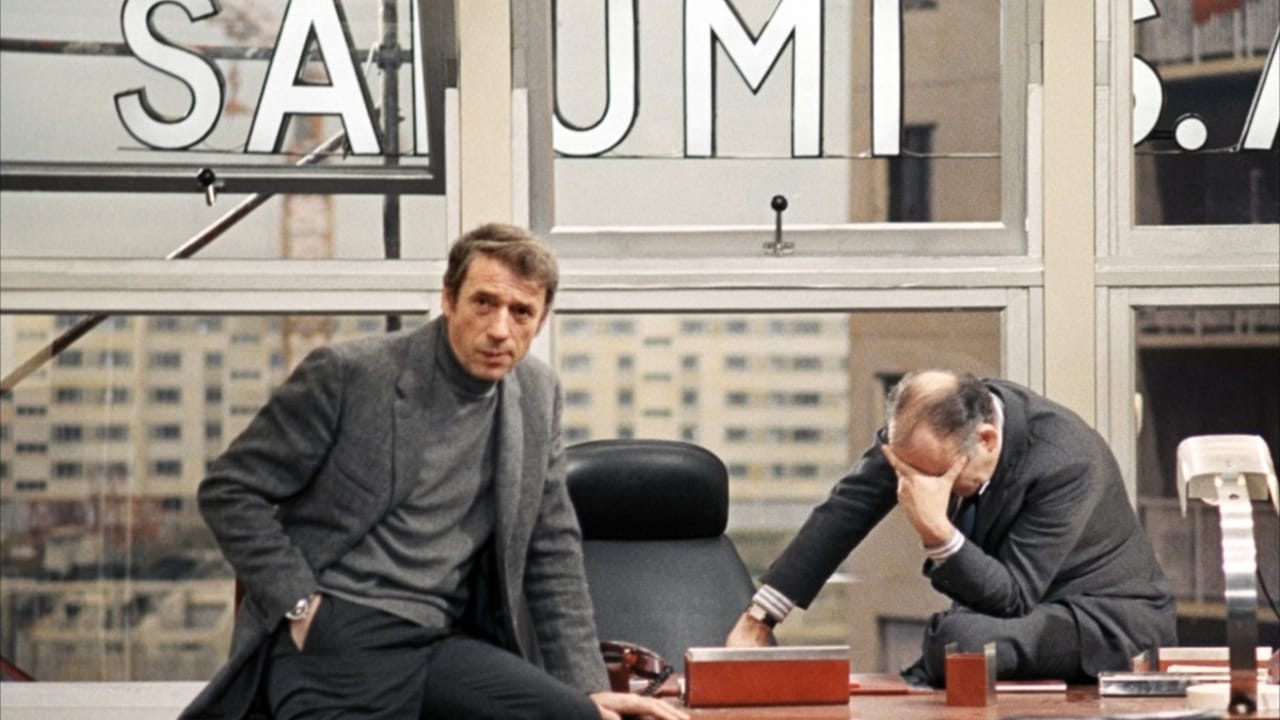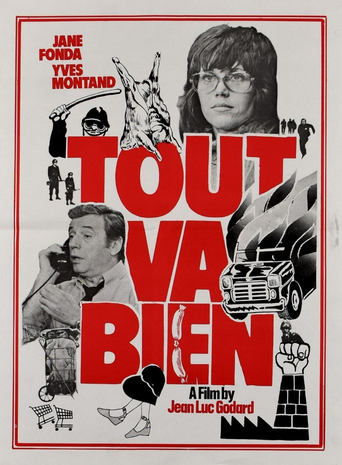

Political upheavals at a sausage factory in France ensnare a visiting female reporter and her commercial-director husband; after they return to the normalcy of their lives, the couple find their marriage has irrevocably changed. Examination of the European class struggle of the early 1970s from filmmakers Jean-Luc Godard and Jean-Pierre Gorin is cheekily framed (though for no apparent reason) by voice-over work from a man and a woman discussing the cinematic possibilities of the material we're seeing. Stars Yves Montand and Jane Fonda are flexible within this flaky milieu, though Godard and Gorin have made the characters colorless, stand-ins for real people. Some of the frank sexual dialogue is bold and surprising, and the cynical finale is thoughtful, but much of the picture is withered by unamusing, unenlightening grandstanding. *1/2 from ****
... View MoreIn our modern society revolutions have become rare. And the times that followed may 1968 were indeed a revolution, albeit in Europe a relatively soft one. In the years 1968-1975 I passed the adolescence, and consequently the era has left a lasting impression on me. Much later I realized that the turmoil of the New Left had already started in the preceding decade, notably in the USA. First there was the civil rights movement, against the segregation. And then there was the resistance against the horrific and pointless Vietnamese war. It launched a counter culture, of hippies and flower power, and new methods of social interaction. The Asean and African nationalist movements enjoyed their newly gained freedom, and in Latin America the dictatorships tumbled. In retrospect many of the new ideas may not have been viable, and often even decadent. But still, for me it is impossible to give an objective judgment of the film Tout va bien. This is especially so, since at the time I have missed the film and therefore the belated acquaintance was making up arrears. To me the film is inspiring, because it uses a truly alternative technique in the narrative. And because it is a reflection on the contemporary thoughts and developments. The technique uses mainly monologues, in which the main characters explain their feelings and thoughts just as if they are interviewed. It starts as a "Lui et elle" film. The French film producer Jacques (Yves Montand) and the American radio reporter Susan (Jane Fonda) have an affair. It is 1972, and they ponder over the events in their careers, notably after may 1968. Jacques makes advertisement clips, but feels unhappy about it. He accompanies Susan to an interview with the manager of the Salumi meat factory. However, just before they enter the building a wild strike is initiated, the offices are occupied by the blue collar workers, and the manager is taken hostage (for some reason, even in our days this can still go unpunished in France). The official of the communist union CGT is furious, and complains about the inadequacy of their actions. The manager uses abusive language, but is also phlegmatic, and defends the conservative entrepreneurial views. We also hear the opinions and feelings of some of the workers. Jacques and Susan are locked up together with the manager, for more than a day. Subsequently we witness several student uproars and riots, which are dispersed by the police. A real story line is absent, and therefore the film can simply end just like he began. In conclusion, the film is a surprising experience. I guess the best way of digesting it would be to analyze all those the monologues, and empathize with them. And I guess that the CGT official is right. Other illustrious films about those days are "Strawberry statement", "Fritz the Cat" (animation) and possibly the most outstanding of all: "Hair". If you like social films, you may find my other reviews interesting.
... View MoreGodard builds his films from scratch. It's not that he shows up on the first day of shooting with no script or idea of what he wants. He simply works from an entirely different angle than most other directors. In an inventive, cerebral, pretentious manor, Godard and his co- director here, Jean-Pierre Gorin, shows us scene after scene. After each one, we naturally ask ourselves questions pertaining to the characters and the story. The story, or should I say the film, unravels further. We then not only ask ourselves the expected question, "What does this movie mean?" We also ask ourselves, "What is this movie about?" Godard drops characters and settings into a stirring pot, sprinkling it with title cards and captions, then pours them all into the oddly shape bowl of a film structure that he has fashioned himself. His cinematic expression is less a communication to and more a confrontation with the audience. He does not make his film easy on you. Still, his cinematography is interesting, and I admire some of his ideas.Have I made it unclear where Tout Va Bien stands in my opinion? OK. Well, let me tell you that it is quite an interesting film, an especially unpredictable one, yet Godard and Gorin, as the occasional European filmmaker will do, just as Haneke does, enjoy the feeling of being beyond the audience. What is said with Tout Van Bien, politically, socially, sexually, is expressed as if we, the audience, are the ignorant ones he is in disagreement with.The high points of this film are the presence of Jane Fonda and a very very long sideways steadicam shot that slowly moves from left to right repeatedly across several check-out lines in a grocery store as tension and rage slowly builds.
... View MoreI've always found a kind of disconnect between the Godard films of the 60's and the Godard films of the 80's, 90's and today, which is that in the past twenty or so years Godard has kept on experimenting, not telling the usual stories that we're used to in movies, with impressive camera-work and aloof actors. But in these films he's also gotten rather boring with his material, and sometimes his experimenting goes a little over the edge for my taste. I had yet to see a work of his from the 70's, however, until Tout va Bien, or Everything is Fine (many of his films are either very limited or totally unavailable in the US). It's actually a good movie for him and co-writer/director Jean-Pierre Gorin. Gorin, unlike Godard, was not a big-time cinephile, but did have motivations to become a political filmmaker. What they concocted was a kind of response to the ways that political films are not made, and should or could be made, in the independent/art world of cinema. This time, as usual, Godard takes very long shots of people talking, and has a couple of his inventive, almost scarily calm tracking shots. But this time as well he has two international stars on his hands. This is where he and Gorin get creative more so. It's a tale of the working class against the ruling class that gets one thinking during the film, and even after it. They place Jane Fonda and Yves Montand as a married couple who get locked in a bitter struggle between meat-factory workers and the management not giving them their proper due. Although Fonda and Montand are the 'stars' of the movie, right off the start of the film (including discussing narrating voices) the whole idea of what this film should be is dissected- the money involved, what the stars should be doing in this story, why should there even BE a story? In short, the film unfolds as the stars become more so observers than the main gig, and the non-professionals (at least I thought they were, they might've been character actors) became the real stars. There are a few monologues, long ones, that go on during this dispute, and they're inter cut with scenes where Godard and Going seem to be showing the double-edge to these workers- they're part determined to get their way, and partly like kids taking over the school.After these scenes, we get mostly all scenes with the stars, as Montand plays a disaffected art-film-turned-commercial director, and Fonda plays an dissatisfied American reporter. Their dialog together sort of winds down the film (including more monologues), leading up to a scene in a supermarket that almost reaches to the heights of the sustained, overwhelming filmic anarchy of the traffic-jam in Godard's Week End. Then the film ends without much else to say. So, basically, Tout va Bien kept me interested with what the characters/actors/people had to say, and unlike in Godard's 80's films there was a structure. And I liked how the screen-time for the extras ended up being balanced out by that of Fonda and Montand.The downsides, which there are a few, are that Fonda and Montand, up until their scenes together &/or their monologues, don't have much at all to do in the film. I can't criticize or comment too much on their acting, because they seem to be too natural (by way of Godard/Gorin's simplicity throughout, sometimes funny sometimes not) to be doing anything very powerful. And there were a few times the experimenting got annoying. But overall, Tout va Bien works on its own terms, and its the kind of film now on DVD can find its audience somehow. Whether or not the same audience that embraced with loving arms Breathless and My Life to Live will do the same with this is another matter- it's part frustrating, but part clarity all the same. At the least, it's not just Godard's doing whether or not the film works or not- Gorin deserves equal credit or berating. B+
... View More